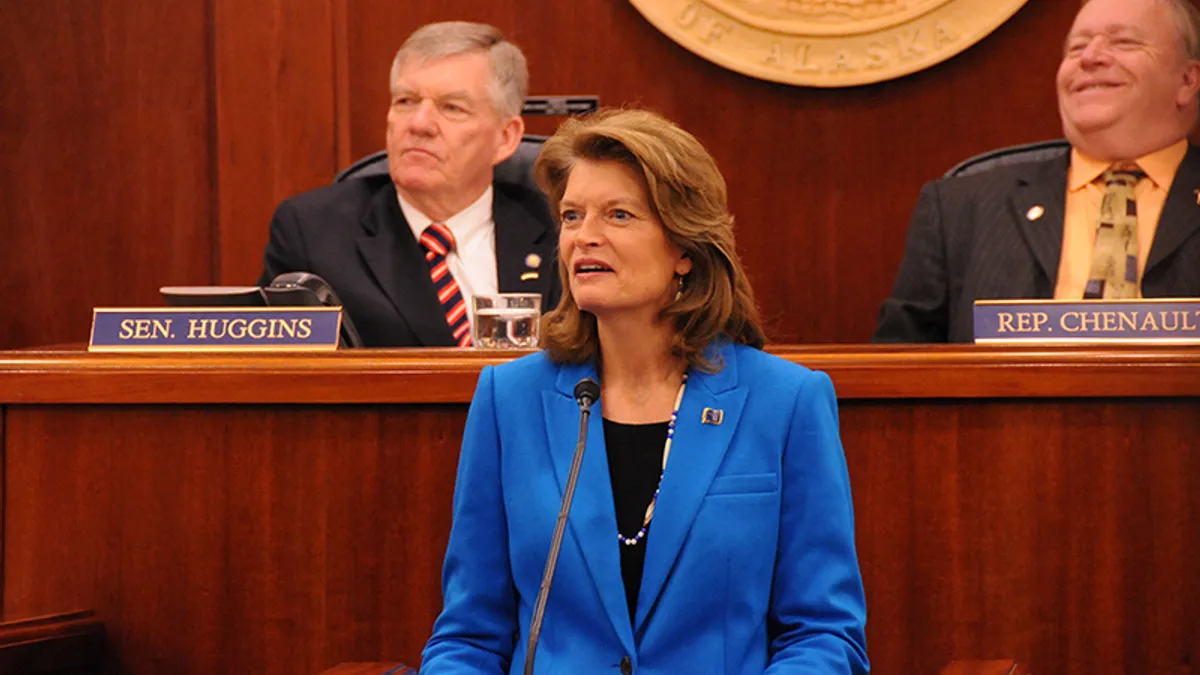Dive Brief:
- Broad, bipartisan energy legislation introduced by the leaders of the Senate Energy and Natural Resources Committee embraces key proposals from both sides of the aisle, including streamlining siting for liquefied natural gas export projects and boosting energy efficiency in federal buildings.
- The extensive bill, introduced on Wednesday, would also authorize longer-term utility energy service contracts, reauthorize weatherization and state energy programs and calls for more study of grid storage.
- The bill was introduced by Sen. Lisa Murkowski,(R-AK) and Sen. Maria Cantwell, (D-WA), the chair and ranking member of the Senate Committee on Energy and Natural Resources, respectively. It is the first broad bipartisan energy legislation since 2007.
Dive Insight:
Developing legislation with members from across the aisle, rather than keeping the discussion within the party, can be a particularly contentious and time consuming strategy. But Murkowski and Cantwell believe that's the only way the Energy Policy Modernization Act of 2015 actually has a shot at passing.
“It’s not the easiest way to write legislation, especially nowadays,” a spokesperson for Murkowski told The Hill. “But it is the best way to ensure that legislation has the best chance of passing the full Senate.”
The bill would streamline the approval process for projects like the Alaska gasline, set deadlines for LNG export decisions, clarify state eligibility for federal energy loan guarantees and promote development of broad range of energy resources. Also included would be reauthorization of federal weatherization and state energy programs, and a measure requiring agencies to consider grid reliability before issuing new rules.
“Our bill features major provisions that will help us produce more of our world-class mineral base, harness more of our abundant energy resources, support our efforts to invest in renewable energy and energy efficiency, and much more,” Murkowski said in a statement. “From hydropower to methane hydrates, and from permitting reforms to new initiatives to tackle high rural energy costs, my bill will provide significant benefits to residents all across our state,” she said, focusing on the impacts in Alaska.
The bill also seeks to ensure federal permitting decisions on new hydro projects happen quickly, places a 45-day deadline on LNG export applications and calls for the Department of Energy to research grid storage technology.
Late last year, Murkowski announced she would pursue the first bipartisan energy legislation in nearly a decade, and called on her colleagues in the spring to introduce their own bills that could be folded into a broader package. She made good on the request herself, introducing 17 small energy bills in one day in May, on a slate of issues ranging from pipeline and transmission infrastructure to microgrids.
Among the notable proposals from Democrats included a national energy storage mandate for utilities, introduced by Sens. Martin Heinrich (D-NM) and Angus King (I-ME). King also introduced a novel bill that would have amended the Public Utilities Regulatory Policy Act (PURPA) of 1978 to stimulate the development and interconnection of distributed resources.
Those proposals didn't make it into the final version of Murkowski and Cantwell's bill, but the section compelling DOE to research storage may indicate that senate leaders are beginning to think more about storage and DER policy on the federal level.
Over on the House side, Rep. Fred Upton (R-MI) also unveiled broad energy legislation this week. The energy committees in both chambers are now in discussion on their respective bills, which could be reconciled in a conference committee should they both pass.














